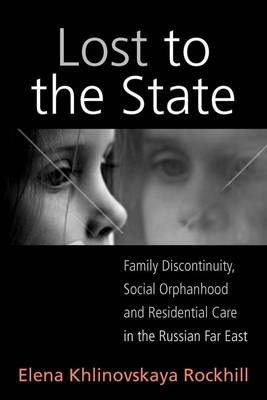
Stock image for illustration purposes only - book cover, edition or condition may vary.
Lost to the State: Family Discontinuity, Social Orphanhood and Residential Care in the Russian Far East
Elena Khlinovskaya Rockhill
€ 142.59
FREE Delivery in Ireland
Description for Lost to the State: Family Discontinuity, Social Orphanhood and Residential Care in the Russian Far East
Hardback. Childhood held a special place in Soviet society: seen as the key to a better future, children were imagined as the only privileged class. That is why the rapid emergence in post-Soviet Russia of the vast numbers of social orphansA" or children left without parental care,A" children who have living relatives but grow up in residential care.. Num Pages: 400 pages, 1, black & white illustrations. BIC Classification: 1DVUA; JFSP1; JHM; JKSB1. Category: (UP) Postgraduate, Research & Scholarly. Dimension: 234 x 156 x 22. Weight in Grams: 735.
This study is extremely well done; a fluently written, scholarly account and analysis that provides a necessary addition to the post-Soviet literature, which has few such sharp analyses of the family, not least because the author takes on relevant debates and histories that both add considerable depth to this discussion and widen the applicability of the primary focus. Thus, we are given a marvellously careful and detailed insight into the workings of a provincial bureaucracy still shaped by the mores and customs of a Soviet bureaucracy but now faced with the sharply different context of the post-Soviet world. * Catherine Alexander, Goldsmiths College, London Childhood held a special place in Soviet society: seen as the key to a better future, children were imagined as the only privileged class. Therefore, the rapid emergence in post-Soviet Russia of the vast numbers of vulnerable 'social orphans', or children who have living relatives but grow up in residential care institutions, caught the public by surprise, leading to discussions of the role and place of childhood in the new society. Based on an in-depth study the author explores dissonance between new post-Soviet forms of family and economy, and lingering Soviet attitudes, revealing social orphans as an embodiment of a long-standing power struggle between the state and the family. The author uncovers parallels between (post-) Soviet and Western practices in child welfare and attitudes towards 'bad' mothers, and proposes a new way of interpreting kinship where the state is an integral member. Elena Khlinovskaya Rockhill was born in Russia and first trained as a Biologist. In 2004 she received her Ph.D. in Social Anthropology from Darwin College, Cambridge University. From 2004-2007 she worked as a Research Associate at the Department of Social Anthropology, Cambridge University. She was a 2007 Wenner-Gren Hunt Postdoctoral Fellow, and a PI for an ESF-funded international project 'Moved by the State: Perspectives on Relocation and Resettlement in the Circumpolar North' at the University of Alberta, Canada (2007-2010).
Product Details
Publisher
Berghahn Books
Format
Hardback
Publication date
2011
Condition
New
Number of Pages
336
Place of Publication
Oxford, United Kingdom
ISBN
9781845457389
SKU
V9781845457389
Shipping Time
Usually ships in 4 to 8 working days
Ref
99-1
About Elena Khlinovskaya Rockhill
Elena Khlinovskaya Rockhill was born in Russia and first trained as a Biologist. In 2004 she received her Ph.D. in Social Anthropology from Darwin College, Cambridge. In 2004-2007 she worked as a Research Associate at the Department of Social Anthropology, Cambridge University. She is a 2007 Wenner-Gren Hunt Postdoctoral Fellow.
Reviews for Lost to the State: Family Discontinuity, Social Orphanhood and Residential Care in the Russian Far East
This study is extremely well done; a fluently written, scholarly account and analysis that provides a necessary addition to the 'post-Soviet' literature, which has few such sharp analyses of the family, not least because the author takes on relevant debates and histories that both add considerable depth to this discussion and widen the applicability of the primary focus. Thus, we are given a marvellously careful and detailed insight into the workings of a provincial bureaucracy still shaped by the mores and customs of a Soviet bureaucracy but now faced with the sharply different context of the post-Soviet world.A Catherine Alexander, Goldsmiths College, London
